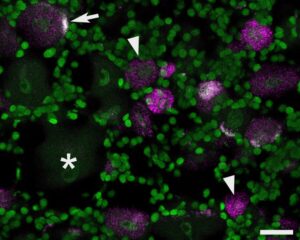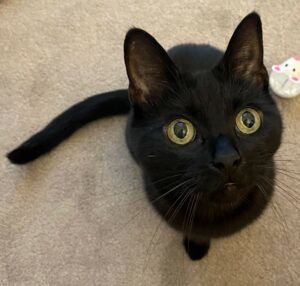Our current research in neurological disease and pain management
Explore more PetSavers-funded research in other disease areas
|
|
A laboratory appraisal of SCN10A as an analgesic target in canine sensory neuronsStudent Research Project Grant: £2,800 awarded in 2025 Institution: University of Glasgow Lead researcher: Andrew Bell Student: Brandi Butler Novel pain killing drugs in humans target the neuron-specific sodium channel Nav 1.8, but it is unclear if these drugs will work in dogs. Aim: By understanding the cellular patterns of Nav 1.8 in the dorsal root ganglion, the hope is to be able to rationalise the use of novel pain killers in dogs and ultimately treat pain better. |
|
|
Identification of the genetic variant that causes spongiform leukoencephalomyelopathy (SLEM) in the Border Terrier dog breedMaster’s Degree by Research: £39,411 awarded in 2024 Institution: University of Cambridge Lead researcher: Lisa Alves Student: Susana Monforte Monteiro Spongiform leukoencephalomyelopathy, or shaking puppy syndrome, is a degenerative spongiform change of myelin in the white matter of the central nervous system, principally in the cerebellum, brainstem and spinal cord. Aim: This project aims to identify the causal genetic variant (confirming previous studies or identifying a new, linked variant) and understand how and why that variant is pathogenic, leading to improved treatments or disease management. |
|
|
Cell-based assays to detect ‘low-affinity’ antibodies against acetylcholine receptors or antibodies against other neuromuscular junction antigens in canine myasthenia gravisResearch Fellowship Grant: £70,000 awarded in 2023 Institution: University of Cambridge Lead researcher: An Vanhaesebrouck Myasthenia results from defective transmission at the neuromuscular junction, and is characterised by fatigable skeletal muscle weakness. It can be inherited, but is more commonly acquired (called myasthenia gravis) and is caused by pathogenic autoantibodies targeting the neuromuscular junction. The major antibody target is the nicotinic acetylcholine receptor (AChR), and disease in dogs is confirmed by quantifying AChR autoantibodies using a serological radioimmunoassay (RIA). A proportion of dogs presenting with suspected myasthenia gravis have no detectable AChR antibodies in this assay, but some are predicted to have low-affinity antibodies against AChRs or other neuromuscular junction proteins. These are not detected by traditional RIA, but could be detected by cell-based assays, as in humans. Aim: This study will explore whether cell-based assays can detect low-affinity antibodies that are undetected by RIA in dogs with seronegative myasthenia gravis. In future, we expect cell-based assays to be used as a second line diagnostic assay to investigate dogs highly suspected for myasthenia gravis, but who have shown negativity by RIA. An improvement in antibody detection would increase the number of dogs correctly diagnosed that can receive prompt and targeted treatment, resulting in a better outcome. Read the team’s published case series of 167 dogs with myasthenia gravis, including 37 seronegative animals here. An Vanhaesebrouck was interviewed as part of our Meet the Researcher series here. |
|
|
Effectiveness of low-level laser therapy for the treatment of osteoarthritis-associated pain in client-owned dogsClinical Research Project Grant: £10,000 (including £5,000 from The Debs Foundation) awarded in 2022 Institution: University of Cambridge Lead researcher: Chiara Adami Osteoarthritis is a progressive, degenerative disease that causes chronic pain and decreased joint function. Common treatments include the long-term administration of non-steroidal anti-inflammatory drugs and nutraceuticals, potentially with the addition of gabapentinoids and opioid analgesics; however, these may be ineffective and associated with gastrointestinal, hepatic, and renal side effects. Recently, there has been an increasing interest in non-pharmacological therapy including electroanalgesia techniques using laser. Aim: This prospective trial will investigate the effectiveness of low-level laser therapy to treat osteoarthritis-associated pain in dogs affected with either elbow or shoulder osteoarthritis. |
|
|
Autoimmune encephalitis in cats: beyond the tip of the icebergMaster’s Degree by Research Grant: £39,961.60 awarded in 2022 Institution: University of Oxford Lead researcher: Sarosh Irani Student: Rachel Hall Building on the work of a recent BSAVA PetSavers-funded project by the same group, this master’s degree aimed to expand diagnostic testing for autoimmune encephalitis in cats by detecting LGI-1 antibodies, and assess long-term outcomes in antibody-positive cats. The researchers hosted an open day for the owners of cats involved in the study. |
Our past research in neurological disease and pain management
|
|
Evaluation of cognitive function in a prospective ageing and welfare study in cats (Cat PAWS)Student Research Project Grant: £1,250 awarded in 2024 Institution: University of Liverpool Lead researcher: Gemma Walmsley Student: Reid Shrubshole Little is known about feline cognitive dysfunction (FCD) and it is thought to be underdiagnosed. This undergraduate project examined questionnaire data from 235 cats enrolled in the CatPAWS study, and found that 141 (60%) demonstrated at least one behaviour associated with FCD although 65 (28%) also had an underlying medical condition. The most common behaviour reported was increased affection/attention, followed by altered activity, anxiety and vocalisation. The proportion of cats displaying each behaviour and the number of behaviours displayed by each cat increased with age: 86% of cats over 13 years showed ≥3 signs. Take home message: Behavioural changes associated with cognitive dysfunction are common in ageing cats in the CatPAWS study, although comorbidities might account for these signs. A new questionnaire for FCD scoring clinical signs to aid diagnosis and monitoring is warranted. Reid presented these findings as an abstract at BSAVA Congress 2025, which can be read here. A recording is freely available (skip to 0:56:48). |
|
|
Comparison of the performance of a smartphone facilitated manually adjusted target controlled infusion of propofol in comparison with a conventional variable rate infusion in dogs undergoing elective surgical proceduresClinical Research Project Grant: £9750 awarded in 2021 Institution: University of Surrey Lead researcher: Sean Langton Propofol is an anaesthetic given by injection into a vein which can be used to induce and maintain general anaesthesia. It is traditionally administered as a continuous infusion with the dose calculated according to patient bodyweight. However, this does not take into account tissue accumulation of the drug over time, and requires manual recalculation of the dose when a change in the depth of anaesthesia is needed. Target controlled infusion (TCI) aims to overcome these problems using data from pharmacological studies to predict the blood concentration of propofol. This is widely used in human medicine, and although it has been researched in dogs, clinical use is limited. A system for manually adjusted propofol TCI in dogs, utilising a smart phone, has been developed and tested in computer simulations. Take home message: This study showed that hand-held ultrasound devices are a viable option for providing locoregional anaesthesia in all aspects of veterinary practice. An article about the study was published in BSAVA’s Companion magazine. |
|
|
Improving recognition, diagnosis and treatment of cats with seizures due to autoantibodies of the central nervous system, a treatable cause of feline seizures and status epilepticusClinical Research Project Grant: £8000 awarded in 2020 Institution: University of Oxford Lead researcher: Sophie Binks Diagnosis and management of seizures is an important challenge in feline health. In the UK, 0.16% of cats presenting to first opinion practice have recurrent seizures, while seizuring cats may represent as many 3.5% of referral patients. Seizures can be due to swelling of the brain (encephalitis), and in autoimmune forms of the disease the immune system produces antibodies against the brain itself, e.g. against molecules such as LGI-1 seen in cats with Feline Partial Cluster Seizures with Orofacial Involvement (FEPSO). FEPSO cats can be successfully treated with inexpensive drugs such as steroids, but awareness of the disease is low so this opportunity may be missed. This project aimed to raise awareness of FEPSO as an important differential diagnosis, and improve its diagnosis through developing new tests. An abstract was presented at the Association of British Neurologists conference in 2022 and the team reviewed the scientific and clinical aspects of LGI1-autoantibodies in feline patients for The Veterinary Journal. Dr Sophie Binks was also interviewed for our Meet the Researcher series. |
|
|
Recovery of ambulation in medically-managed non-ambulatory dogs with thoracolumbar intervertebral disc herniationClinical Research Project Grant: £13000 awarded in 2019 Institution: University of Cambridge Lead researcher: Paul Freeman Thoracolumbar myelopathy caused by intervertebral disc extrusion (TL IVDE) in dogs is a common presentation in first opinion and referral practices. Severely affected dogs, particularly those which lose deep pain perception in their hind limbs, are thought to need decompressive surgery to recover ambulation. However, these costs can be prohibitively high for some owners, and dogs may be euthanised as a result. This study examined whether non-surgical (conservative) management, including analgesia, movement restriction and bladder management, could be successful in enabling small (<15 kg) non-brachycephalic dogs with thoracolumbar intervertebral disc herniation (TL IVDH) to regain ambulation. Of the 51 cases of TL IVDH that were deep pain-positive, 49 recovered ambulation during the 12-week study period, compared with 10 of the 21 that were deep pain-negative. Reduction in spinal cord compression varied among individuals from minimal to complete and appeared unrelated to the recovery of ambulation. Take home message: Conservative management should be considered for small, non-brachycephalic dogs with acute thoracolumbar disk herniation if surgical intervention is not possible. Regression and spontaneous decompression are not necessarily required for functional recovery. An article about the study was published in BSAVA’s Companion magazine. Findings were also published in the Journal of Veterinary Internal Medicine Sam Khan was the recipient of the 2024 BSAVA PetSavers Annual Research Award for this paper. |









